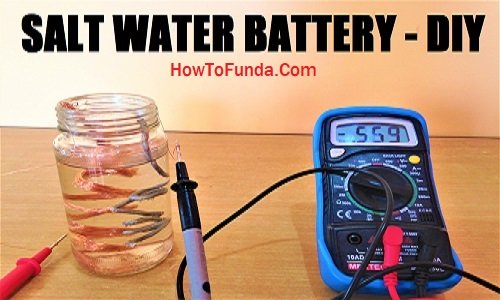INTRODUCTION
In this topic, we are going to show you how to make the saltwater battery model at home for your science project or exhibitions.
This homemade DIY rechargeable saltwater battery science experiment is done using materials like water bottle, copper wires, salt, and water which is easily available at home at low cost. This experiment can be used for class 5 to class 7 students
Salt Water Electricity Explanation

Electricity is a form of energy which occurs due to the existence of charged particles dynamically as a current.
Sodium ions and chloride ions are ionic compounds of salt. An ion is a molecule or atom with a net electric charge due to the gain or loss of one or more electrons.
Whenever table salt is dissolved in water, water molecules separate sodium and chlorine ions.
Hence ions float freely in water carrying electricity and making the water conducive.
The electrical conductivity of saltwater experiment for a school project at home step by step video
In this video, we will show steps by step video instructions on how to make the saltwater battery model at home easy way.
First, take an empty glass bottle and put the thick curled copper wire inside it.
Tie a thin copper string to the thick curled iron wire and put it inside the empty glass bottle.
Now tie one end of thick curled copper wire to the red wire of meter reading and similarly tie one end of the thick curled iron wire to the black wire of meter reading as shown in the video.
Take a glass of water and add multiple spoons of salt to it. Stir it thoroughly with a spoon till the salt is completely dissolved in water.
Pour the salted water into the glass of bottle containing curled copper wire and curled iron wire.
Observer the meter readings and you will see the numbers changing indicating that electricity is flowing through salted water due to the free flow of sodium and chloride ions of salt.
Here now water is acting as conducive for transmission for electricity.
Materials Used
Materials used in this video are shown below to build a saltwater battery model at home by taking the help of your parents.
- Empty
glass bottle
- Thick
copper wire
- Thick
iron wire
- Meter
reader
Questions & Answers
1. Can saltwater power a light bulb?
Sodium and chloride ions float freely in the saltwater and since ion has an electrical charge it can freely float in water. When a circuit is created with electricity source and a light bulb then it will be possible to light up the bulb.
2. Why is saltwater conductive to electricity?
Saltwater is a good conductor of electricity.
3. How does noise pollution affect us?
It affects both health and behavior. It can also physiological health.
Conclusions
Saltwater battery model helps students to learn electricity conductivity as well as how to make it with easily available materials at home.

